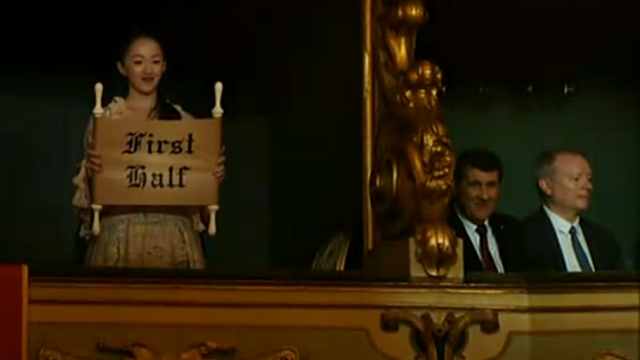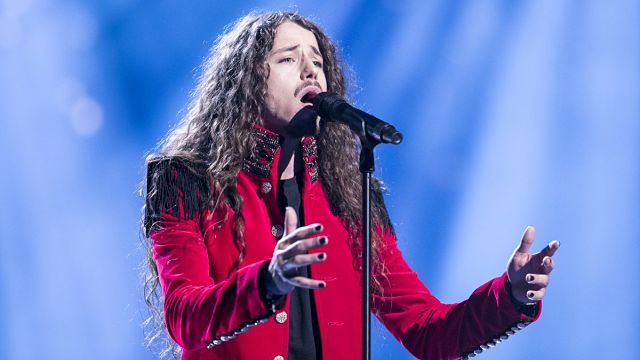How Junior Eurovision Picks A Running Order
Junior Eurovision, like its older sibling, has a producer led running order. Just like the main Eurovision Song Contest, acts get to draw out which half of the show, first or second, they will perform.
This took place as part of the Opening Ceremony festivities on Monday night. Each act was invited to select their position in the running order from sealed, opaque plastic balls at the front of the stage. In each ball was a different number. So much was good practice. Sadly each number referred not to a start position or half slot, but to a balcony in the Manoel Theatre. From that balcony a young volunteer held up a scroll to reveal if they would perform in the first half or second half, or as per Junior Eurovision rules, if they would open or close the show.

Jon Ola Sand watching on as the draw takes place at the Manoel Theatre
The process was seamless and I am sure executed perfectly, but adding the extra delay of a few seconds as the scroll is found and revealed isn’t the most transparent way of conducting a draw. Furthermore it is also worth critiquing how Malta’s running order position was selected. Christina Magrin, the host country representative, drew a position in the first half of the draw. Now to avoid host producer bias the running order position for the host country should be decided by random draw. What happened as it so transpired is that the EBU and PBS had a draw, behind closed doors, which resulted in Malta being given 5th in the running order.
Our colleagues at ESC Daily asked Jon Ola Sand, Executive Supervisor of the Junior Eurovision Song Contest, to comment on this, where he stated that the ‘everything in the draw had gone according to procedure.’ If the procedure was to do this and run a separate draw backstage I would argue was sloppy and poorly thought out. It may ‘only’ be Junior Eurovision, but children as much as adults will question if things don’t seem fair. Transparency is the best way to prove it is fair.
Running Order Still Matters
The EBU have previously said that they believe running order not to have any significant impact of the result of the Eurovision Song Contest. We have disproved this in our statistical analysis of the 2014 Eurovision Song Contest, concluding the running order does factor on the final scores.
With Junior Eurovision switching to the 100% jury system one may expect that the effect of running order bias may be negligible. However the data from 2014 would be a lot less certain of that fact. In that analysis we split the correlations for the televoters and the juries having impact on the results.
Televoters correlation: +0.512
Jury correlation: +0.455
The positive number here means that yes, there is a positive change in your final position in running order. What you will note is that we are slightly less confident that the jury vote is affected by the running order by televoters, but this result still means we are above the 90% confidence level to assert there is correlation between the two. The running order may only impact by a few percentage points at best, but in a competition as tight as Junior Eurovision that could make all the difference. Even with 100% jury we are confident some running order bias will exist.

Poland in recent years has been the perfect example of juries and televoters often having very different opinions (Photo: Andres Putting, EBU)
We know that the running order as a mathematical placing from first to last has an impact. We also know from 2005 to 2007 Junior Eurovision was won by the song performed last and in 2003 the winner performed 2nd in the show (Bulgaria also won the televote from 2nd in 2014). Running order certainly does not mean everything.
However when we analyse who has a good or bad running order position for the little bumps either way we are looking more for the impact of the producers’ placings to make a great show. Where in the show is the audience crescendo coming from? This is what makes running order winners and losers and after seeing each song rehearse once we have our picks of the best slots.
Our Running Order Winners
Poland – Olivia Wieczorak – ‘Nie Zapomnij‘
Olivia Wieczorak is a dead cert to smash Poland’s Junior Eurovision record, with the country only getting a total of six points from their last two performances way back in 2003 and 2004. The vocals are on point and this by-the-numbers ballad does all the things you want it to.
Drawn in the first half, the producers have placed the Polish entry late at position 8. This comes immediately after Macedonia with ‘Love Will Lead The Way’, the fun loving party tune of this year’s contest. The crowd will get going for this one but it’s a genre that’s less friendly in the points scoring charts. Olivia’s clean vocal will shine after this and be the natural high to the first half. Poland’s best result is all but guaranteed but it really could be so much more.
Australia – Alexa Curtis – ‘We Are‘
There’s a trio of songs towards the end of the second half that possibly make for the cheesiest section of any Eurovision show ever. Israel’s duet feels like carbon copy Chanee & N’evergreen, Australia’s hopeful tune ‘We Are’ follows and the run is completed by Dutch entry ‘Kisses and Dancin’ – the kiddie pop track of the year. Even for Junior veterans this could smell like its been left out in the Maltese sunshine for too long.
What might help Alexa Curtis stand out in this section is that even before the first chorus she’s using the favourite Australian artist trick of ditching the melody to freestyle in some bigger notes. Compared to the very on-the-button entries around this might make her track and her voice sound more impressive and help Australia place above the other two countries in the final scoreboard. Australia does not have much voting support with the heavy Eastern bias in Junior Eurovision and such a result would probably be acceptable to the team from Down Under.
Cyprus – George Michaelidis – ‘Dance Floor‘
Being given the latest possible slot of those selected in the second half, Cyprus can already be happy with their running order position. However after the cheesefest prior this provides the much needed biscuit to offer some texture to the show.
‘Dance Floor’ has significantly more bite but we’ve been impressed in the press centre that the vocal cookie has enough chocolatey smoothness to contrast the electronic beats biting through the chorus. The fire effects on the backdrop help give this a sense of battle and make it a competitive song with a strong stage show. If he can pull off the dance moves and create a big stage atmosphere the other songs in the bottom half may crumble like wafers.
Our Running Order Losers
Russia – Water of Life Project – ‘Water of Life‘
Russia’s Water Of Life Project has come into the contest with plenty of support around social media billing the group as one of the favourites. While they most certainly can still win from position four, there’s a slight push with the early position to make them vulnerable.
Albania comes in just before with emotional ballad ‘Besoj’. Musically the quartet from Russia have a much more gentle melody than what comes before it, perhaps making it less memorable than you could anticipate. Russia also comes up before the natural high we have in the running order this year from our host country with uplifting ‘Parachute’.
I am sure the Russian track would have liked not just to be later but also away from Malta and up against the other choreographed groups where the harmonies will get chance to shine.
Ukraine – Sofia Rol – ‘Planet Craves For Love‘
Ukraine’s running order slot, despite being second half, I would argue nudges the country away from making it a double Eurovision victory in 2016.
Belarus just before is looking incredibly slick with the hoverboarding action top drawer in the skills cabinet. This means ‘Planet Craves For Love’ feels decidedly downbeat coming in with its sincere message. It’s also coming in off the back of where the first scheduled interval act is in the production meaning this is starting from a crowd in energy free-fall.
Afterwards we have the Fiamma Boccia with ‘Cara Mamma’ which is a much more hard-hitting yet equally sentimental ballad and far more vocal energy than what Sofia Rol is offering. Vocal capacity is still criteria number one on the jurors’ lists remember.
And One We Don’t Have A Clue About
Georgia – Mariam Mamadashvili – ‘Mzeo‘
The Georgian song this year was randomly drawn to end the show. We are quite confident that if any producer in any country was given the choice of placing a song last, they wouldn’t have chosen ‘Mzeo’.
Feeling like we’ve stepped back in time to an old piece of music hall, little Mariam belts her way through the later parts of this classical track reasonably effortlessly and impressively. However it’s in a genre of music which we have no idea at all for how successful it will be.
In many a sense the Cypriot track feels like the closer to the show and Georgia comes in almost like the first ever interval act. However what we are unsure about is if this is a ‘wow’ moment or a ‘what is that’ way to end the show.
At least for the ESC Insight team, this type of unpredictability and randomness adds to the edge of the competition. That makes the show feel more energetic and more alive and a more dramatic broadcast.
What do you think about the show? Has any other song stood out for you from the running order or the rehearsals? Let us know below!










The draw throws everything up in the air. Arguably 4 of the 5 strongest songs in the contest are drawn in positions 2 – 5. The only beneficiary from this sequence is likely to be Malta but can it win from position 5? None of the entries that have landed second half look like winners. I agree that Poland has a good draw and the strong vocal will help it but will juries go for a (typically for Poland) dated and ‘by the numbers’ ballad? FYR Macedonia is my fifth of the strongest songs, but I fear the stage performance will sink it. If I was putting money on it (and it is probably a good thing that the bookies don’t allow us to bet on a children’s event) I would probably favour Malta at this stage, but I really haven’t a clue who will take the honours on Sunday.